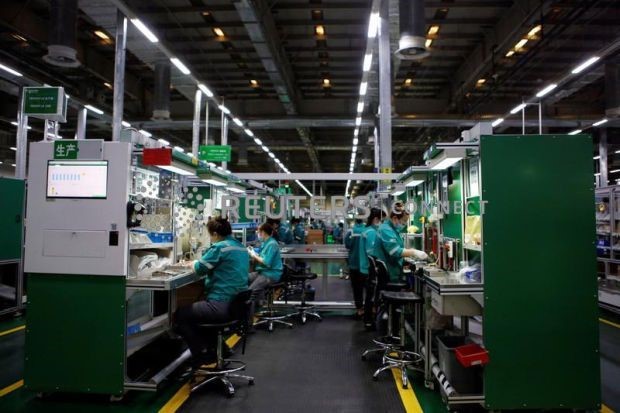
LONDON/TOKYO: Global growth in factory activity slowed in May as China's strict coronavirus curbs and Russia's invasion of Ukraine disrupted supply chains and dampened demand, adding to woes for businesses already struggling with surging raw material prices.
Manufacturing growth slowed last month in economies as diverse as France, Japan to Malaysia, business surveys showed on Wednesday, illustrating the challenge policymakers face in trying to combat inflation while not stifling anaemic economic activity.
S&P Global's final manufacturing Purchasing Managers' Index (PMI) for the euro zone fell to 54.6 in May from April's 55.5, its lowest since November 2020 though just ahead of a preliminary reading of 54.4. Anything above 50 indicates growth. EUR/PMIM
In Britain, manufacturing activity expanded last month at the weakest rate since January 2021 as producers of consumer goods struggled against a worsening cost-of-living crunch.
"Inflation is driving up the cost of doing business and dampening some consumer demand," said Simon Jonsson at KPMG.
"The conflict in Ukraine has caused new and worsened supply shortages, while COVID-19 restrictions in China, and border friction closer to home, have also adversely impacted UK manufacturing."
China's Caixin/Markit Manufacturing PMI showed a further contraction there, standing at 48.1 in May although improving slightly from April's 46.0, a private survey showed. That was in line with official factory activity data released on Tuesday
While COVID curbs are being rolled back in some cities, suggesting China's manufacturing slump has bottomed out, analysts do not expect a rapid rebound like in early 2020, saying fears of fresh outbreaks will continue to weigh on confidence and demand.
"Disruptions to supply chains and goods distribution may gradually ease as Shanghai's lockdown ends. But we're not out of the woods as China hasn't abandoned its zero-COVID policy altogether," said Toru Nishihama, chief economist at Dai-ichi Life Research Institute in Tokyo.
"Rising inflation is forcing some Asian central banks to tighten monetary policy. There's also the risk of market volatility from U.S. interest rate hikes. Given such layers of risks, Asia's economy may remain weak for most of this year."
CHINA SPILLOVER
Lockdowns in China have snarled global logistics and supply chains, with both Japan and South Korea reporting sharp declines in output.
Japan's manufacturing activity grew at the weakest pace in three months in May, and manufacturers reported a renewed rise in input costs, the PMI survey showed, as the knock-on effects of China's lockdowns and the Ukraine conflict pressured the economy.
The final au Jibun Bank Japan PMI fell to a seasonally adjusted 53.3 in May from 53.5, marking its slowest pace since February.
In a glimmer of hope, South Korea's exports grew at a faster pace in May than a month earlier, separate data showed on Wednesday, as a rise in shipments to Europe and the United States more than offset fallout from China.
The monthly trade data, the first to be released among major exporting economies, is considered a bellwether for global trade.
India's factory activity expanded at a higher-than-expected pace in May, with demand resilient despite persistently high inflation.
Source: https://www.thestar.com.my/business/business-news/2022/06/02/manufacturing-growth-slowed-last-month-in-economies-as-diverse-as-france-japan-to-malaysia

